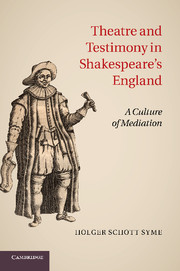Book contents
- Frontmatter
- Contents
- Illustrations
- Acknowledgments
- Textual note
- Abbreviations
- Introduction: The authenticity of mediation
- Chapter 1 Trial representations
- Chapter 2 Judicial digest
- Chapter 3 Performance anxiety
- Chapter 4 Royal depositions
- Chapter 5 The reporter’s presence
- Epilogue: The theatre of the twice-told tale
- Select bibliography
- Index
- References
Chapter 2 - Judicial digest
Edward Coke reads the Essex papers
Published online by Cambridge University Press: 05 March 2012
- Frontmatter
- Contents
- Illustrations
- Acknowledgments
- Textual note
- Abbreviations
- Introduction: The authenticity of mediation
- Chapter 1 Trial representations
- Chapter 2 Judicial digest
- Chapter 3 Performance anxiety
- Chapter 4 Royal depositions
- Chapter 5 The reporter’s presence
- Epilogue: The theatre of the twice-told tale
- Select bibliography
- Index
- References
Summary
On 8 February 1601, Robert Devereux, the second Earl of Essex and Elizabeth I’s last favourite, having assembled 300 armed followers, marched from his house in the Strand into the City of London. He had fallen from grace after a disastrously failed military campaign in Ireland, and would later claim that he and his supporters were trying to force an audience with the queen – allegedly to convince her that his life was being threatened by his enemies on the Privy Council. From any perspective but Essex’s, the uprising was an open attempt both on the queen’s life and at usurping the throne. Either way, the rebellion collapsed within hours. Many of the high-ranking nobles associated with Devereux’s circle found themselves prisoners, and the earl himself was put on trial for treason eleven days later, on 19 February.
Those days were a period of intense activity for his prosecutor, Attorney General Edward Coke. He had to draw up lists of the large number of gentlemen and noblemen that had been imprisoned all over London in the aftermath of the uprising, assemble committees to conduct interrogations, question prisoners himself, and devise his prosecutorial strategy. But most importantly, Coke had to read. During those eleven days, and in the weeks leading up to a subsequent less spectacular trial of a small group of Essex’s supporters, Coke read, reread, and reread again a substantial collection of confessions and examinations. As most well-trained humanist readers would have done, he dissected the texts into a collection of largely independent fragments in order to reassemble them in new arrangements when he presented his arguments and proofs in court. This reading strategy enabled him to establish a powerful synthetic account, a narrative deriving its authority equally from the standing of the Attorney General and the sworn testimony he presented. When Coke noted in his opening statement that it was remarkable how, despite ‘being severally examined, all [witnesses] agreed without varying’, he described the outcome of a deeply involved effort to digest, interpret, and ultimately reproduce in court the various statements in such a way as to produce a coherent story. The prosecutor as active reader was the key figure in this effort, and this chapter accordingly traces the ways in which his reading practices employed the logic of mediation I have described in the preceding chapter – a logic that, as I will show, also informed the Humanist methods of reading that spread throughout Europe in the sixteenth century and shaped lawyers’ note-taking habits, evidentiary thinking, and oratory.
- Type
- Chapter
- Information
- Theatre and Testimony in Shakespeare's EnglandA Culture of Mediation, pp. 72 - 110Publisher: Cambridge University PressPrint publication year: 2011



